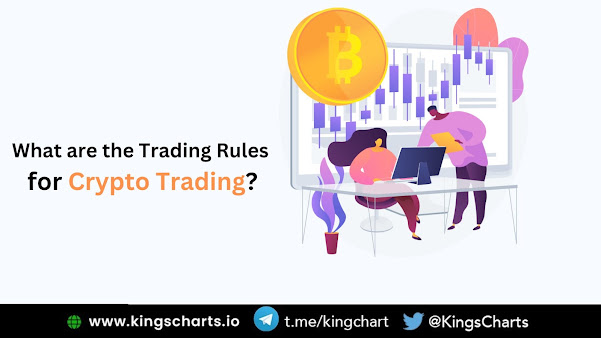What are the Trading Rules for Crypto Trading?
Last year, it seemed as if cryptocurrency prices could only go up and investors couldn't go wrong. Even a trading hamster could identify profitable cryptos. However, several cryptocurrencies are already down 80% or more from their all-time highs. This serves as a clear reminder that these are high-risk investments with the potential for both up and down returns.
About the Blog
Many of the golden laws of crypto investing revolve around the concept of risk minimization. If you're going to acquire cryptocurrency, the ideal scenario is that you benefit if prices rise while avoiding financial ruin if the market falls. At Kings Charts we have procured the most important rules that will assist you in doing so.
1. Only invest funds
that you can afford to lose.
When predictions of Bitcoin (BTC) reaching $1 million are made, the temptation is to throw every possible cent into the king of crypto in the expectation of large rewards. What's the problem? You might lose everything. If you only invest money that you are willing to lose, you will not suffer financial disaster if the industry tanks.
Investing in cryptocurrency is dangerous. There's a potential that blockchain will change the way we manage money or possibly become the internet's future currency. But it might not. Many projects will fail, and the entire industry may collapse. Whether it's regulation, the introduction of central bank digital currencies (also known as Gov Coins), or the advancement of even more advanced technology, it faces a number of critical challenges.
2. Start with an additional financial basis.
If you wish to invest in cryptocurrency, you must first establish solid financial foundations. That involves maintaining an emergency reserve of three to six months' worth of living expenses, as well as keeping up with your retirement contributions. If you're trying to pay off debt, this should take precedence over any crypto investments.
If you have a financial emergency next week, an emergency fund will help you meet it without incurring debt or selling assets at a loss. Assume you spend $2,000 on Bitcoin instead of putting it into an emergency fund last November. Today, it could be valued as little as $600. While it may recover in the long run, if you were forced to sell today, it wouldn't help. How would you feel if you lost your job this week or were in the midst of a medical emergency and your financial safety net was in Bitcoin rather than a bank?
3. Spread out your
investments
Diversification can
take several forms, including the types of assets purchased and the individual
assets within each class. Most Crypto
Trading Experts advise investing only a tiny portion of your whole
money in cryptocurrency. The remainder should be invested in less risky assets
such as real estate or stock. How much depends on your risk tolerance, belief
in cryptocurrency, and financial status. If you have decades until retiring, you
may be more ready to take on more exposure to cryptocurrencies because you will
have more time to recover if things go wrong.
It's also a smart idea to diversify your cryptocurrency investments. Some people exclusively invest in Bitcoin and Ethereum (ETH), which makes sense given that these are the most established cryptos and have the best long-term prospects. However, if you want to buy smaller cryptocurrencies, don't bet everything on one or two.
Consider a variety of crypto sectors based on which ones you believe are promising. For example, my portfolio is significantly weighted toward smart contract cryptos because it is an area in which I have done extensive research and I enjoy that many other cryptos are built on these blockchains. I'm familiar with gaming and metaverse tokens, but I avoid privacy tokens entirely. Other investors will almost certainly have different priorities and areas of expertise.
4. Consider the long term.
One strategy for surviving cryptocurrency volatility is to invest with a 10- to 20-year time horizon. Trying to time the market through short-term trading is nearly impossible, and many investors lose money doing so. Instead, search for initiatives with great leadership and utility that have the potential to perform well in the next decades.
It's not always simple to think long term because the industry is still in its early stages and we don't know how it will evolve. However, it is a strategy that will assist in keeping even extended drops in perspective and avoiding emotional decisions. For example, if you acquired each of the top 50 cryptocurrencies five years ago, you'd be looking at a 700% gain despite the fact that many projects could not survive the 2018 crypto winter.
5. Conduct research
Never buy a cryptocurrency that you haven't thoroughly investigated. We all lead hectic lives, and it can be tempting to invest a modest sum of money in an altcoin that you read about online. However, this is your money, and there is a lot of misinformation out there. Only you are aware of your investment strategy and objectives. Although research does not ensure success, it considerably minimizes the likelihood of being duped or purchasing a cryptocurrency with poor long-term potential.
Frequently Asked Questions
1. What are the rules for trading crypto?
Because crypto is not regulated by FINRA or the SEC like stocks and options, there are no day trading rules.
2. What should you avoid in crypto trading?
- FOMO,
Herding, and Buying Low. This is the big one, and it's one that far too
many rookie traders make..
- Panic
Selling.
- Making
Too Many Trades.
- Keeping
Holdings on Exchanges.
- Making
An Investment All At Once.
3. How many times a day can you trade crypto?
The cryptocurrency markets are a wild, nonstop rollercoaster that operates 24 hours a day, 365 days a year. The markets never close, so you can buy, sell, or trade cryptocurrency whenever you want – that's not to say there aren't periods when it's more advantageous.
In conclusion
Cryptocurrency is a new asset class. Last year, some people felt compelled to purchase cryptocurrency in order to be among the first to capitalize on the next big thing. They bought cryptocurrency because they were afraid of missing out – in some cases with money they needed in the short term, at the expense of other financial ambitions.
If you're thinking about buying cryptocurrency, you should first secure your cash and understand the sector by enrolling in a Crypto Trading Course. In this way, another crypto meltdown will be disappointing but not catastrophic. The present would be the high time to become a crypto trading expert, and learn the crypto trading tricks.




Comments
Post a Comment